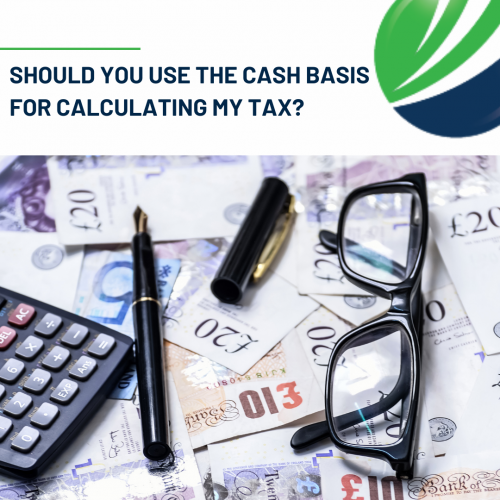Should I use the cash basis for calculating my tax?

posted 27th January 2022
As an unincorporated business (that’s sole traders, self-employed people and normal partnerships) you have the option of using a ‘cash accounting basis’ when preparing your accounts – rather than the more usual ‘accrual basis’.
Preparing your accounts on the cash basis can be simpler and makes your life easier. But, in practice, you will still need to keep track of things like money due from your customers.
So, is it worth making the switch?
The difference between cash accounting and accrual accounting
Your first question is likely to be ‘What does accrual accounting mean, and why is cash accounting any easier?’. Let’s start by looking at the key differences:
- Under the accrual basis, your sales are brought into account when they’re made. Where the customer hasn’t paid, the amount that’s owed is included in the balance sheet as Trade Debtors or Accounts Receivable. On the cash basis, sales are only taken into account when the customer actually pays you – i.e. once you receive the cash.
- Similarly, for purchases and expenses, in accruals accounting the date of receipt or purchase is what counts, with amounts due to suppliers appearing in the balance sheet as Trade Creditors, Accruals or Accounts Receivable. However, under the cash basis, these costs are only offset against profits when the supplier is actually paid.
- For capital assets other than cars – things like plant, equipment, computers etc – under traditional accruals accounting you claim capital allowances. When making use of the Annual Investment Allowance (AIA), many businesses claim the full cost in the year of purchase anyway. On the flipside, if you’re using the cash basis, the costs are taken into account to work out your taxable profit when you buy the items.
- When you’re operating the cash accounting basis, there’s no need to take things like stock or work-in-progress into account.
Changing to the cash accounting basis
Using the cash accounting basis does simplify your bookkeeping and accounting requirements, so it’s worth considering whether a switch from the accruals to cash basis is worthwhile.
- If you’re unincorporated and your annual sales are below £150,000, you can switch from using the accrual basis of accounting to the cash basis. You can continue on this cash accounting basis until your annual sales exceed £300,000.
- If you change from one basis to another, in the first year, the figures need to be adjusted to make sure that transactions are not missed altogether, nor counted twice.
- As an example, if you use the accrual basis and are owed money by your customers at the end of the year, the sales value will have been included in your taxable profit – even though it wasn’t paid. If you change to the cash basis the following year and your customer pays you, if you make no adjustments then you would be taxed on that same sale again. Accordingly, you have to make an adjustment to exclude those receipts from sales in the new year.
- A similar (but opposite) adjustment is required in respect of money owed to suppliers at the time of changeover, as the costs or expenses would already have been allowed for.
- Because stock and work-in-progress don’t feature under cash accounting, any opening value is treated as an expense at the start of the year in which you change over from the accruals basis. By the same token, if there are unclaimed capital allowances on plant and machinery, these are treated as asset purchases when you switch to the cash basis.
- When moving from the cash basis to the accrual basis, similar adjustments are required.
Other factors to consider:
- Interest and fees on overdrafts, loans and credit cards can only be included as an expense up to £500 per year. So, if your costs are higher, the accrual basis may be better. Note that interest on hire purchase agreements is not limited.
- If your business is making a loss under the cash basis that isn’t available as ‘sideways relief’ to reduce other taxable income.
- Accounts prepared on the cash basis may not be suitable for lenders if you’re looking for personal or business funding, including to support a mortgage application.
If you’re thinking about using the cash basis for your accounts, make sure you talk to us first. We’ll outline the limitations and possible pitfalls, as well as the key benefits for the business. We can also advise you whether or not you’re eligible to use the scheme.
Changing from one basis to the other requires calculation of transitional adjustments, and the tax impact of that can be spread over up to six years. So, working with us to minimise the impact makes sense if you’re aiming to simplify your accounting.
Get in touch to talk about switching to cash accounting.


